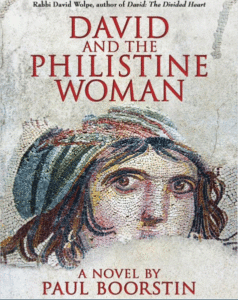David and the Philistine Woman, by Paul Boorstin, Top Hat Books, 316 pages, $19.95
Reviewed by NEAL GENDLER
One problem with writing a novel based on biblical characters is that most readers are familiar with the basic story, and usually, you can’t change the outcome.

So you have to imagine what the characters might think and do around what’s described in the Bible, which usually is bare-bones enough to provide lots of room for invention.
In his entertaining David and the Philistine Woman, officially out Aug. 8, Paul Boorstin creates several subplots explaining why David had to face the Philistine killer Goliath, and why with only his slingshot.
Shepherd David is anointed by the prophet Samuel to succeed Boorstin’s unstable King Saul, who rules a small, poor kingdom of Israelites frequently raided, robbed and brutalized by the neighboring wealthy, warlike Philistines. The Holy Ark frequently must be moved so the Philistines don’t find and capture it.
The Philistines worship the war-demanding idol Dagon and have iron weapons; the Israelites have only copper. The Israelites had iron weapons in Joshua’s time, but their blacksmiths were killed and the skill was lost, the story says.
David and his music revive a failing Saul, who takes the shepherd under his wing, then turns against him when learning that David, not Saul’s son Jonathan, has been anointed successor.
The Philistine woman is Nara, 16, surviving child of master blacksmith Ezel, who has a secret type of bellows that creates sufficient heat for first-class iron weapons. Ezel, who has more work than he can handle and a drinking problem, teaches his extremely tall, strong daughter to make weapons — a capital offense in a society believing that “a woman’s hand on an iron blade weakens it.”
One day, Dagon’s high priest catches Nara at work, but instead of having her killed, he decides that her extraordinary height and strength make her an ideal bride for Goliath, producing a new generation of giant warriors. They marry, but she finds Goliath distasteful. She miscarries, sees Philistine guards kill her father, and flees for her life.
David encounters her outside her city of Gath. Both desire to kill Goliath and plot to use Ezel’s secret device to make the necessary iron weapons. She obtains it, only to lose it while saving a helper’s life.
Subplots include: David rescuing Jonathan from imprisonment in Gath; the hidden existence of Joshua’s iron sword and shield; the attraction between David and Saul’s daughter Michal; and Nara’s encounter with a hidden, persecuted group of women who worship an Astarte-like goddess, Ashdoda. They possess supposedly magical stones from a meteorite shower, calling them “Ashdoda’s tears.” Nara seeks them, thinking they’ll make a copper sword as strong as iron.
We know the ending, but Boorstin creates a twisting, imaginative journey and brings his multiple strands together nicely.
Boorstin is an experienced screenwriter and documentary filmmaker, so I was surprised that his characters’ dialog — usually in complete sentences — sounded so stilted until it occurred to me that he may be following speech patterns found in English translations of the Bible. But if the dialog seems formal and slow, the plot moves right along, drawing you in as it develops.
In a note at the end, Boorstin says he sought to take a wide-angle look at the familiar story “based on the narrative I imagined between the lines.” That includes David’s thoughts, which appear in italics, and a more-developed look at the Philistines. Recent archeological discoveries at Beit Shemesh, Ashkelon and other digs “have revealed that the Philistines were an advanced, sophisticated people,” he says.
He also wanted roles for David’s mother and Saul’s daughter Michal, who would become David’s wife, “the only woman in the [Jewish Bible] of whom it is explicitly said she loves a man (I Samuel 18:20).”
His David longs to hear the voice of God, as did Abraham and Moses, but he never does.
“Like David,” Boorstin says, “in our troubled world, we must do the right thing without hearing a divine voice to direct our actions.”
***
Neal Gendler is a Minneapolis writer and editor.
(American Jewish World, 7.28.17)



















